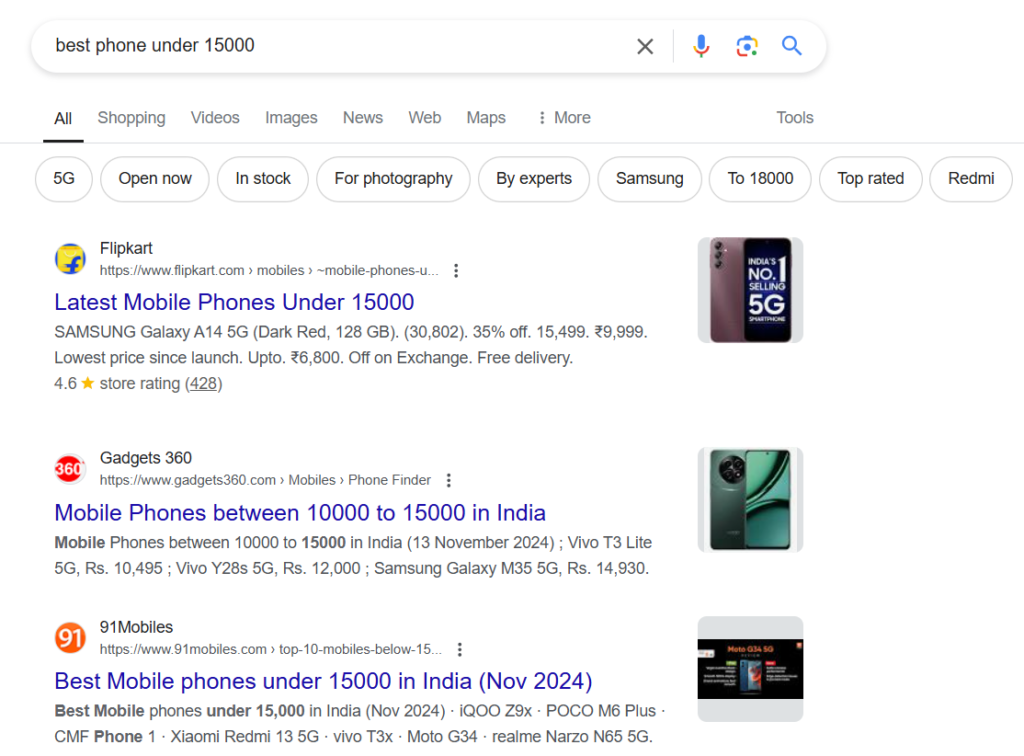What are SEO Keywords?
Keywords in SEO are the phrases or words people use to hunt for products, services, or information online. Further, these are the words or phrases search engines utilize to rank and sort information. You optimize your web content around keywords in SEO so you may be noticed and generate traffic to your website—hopefully, in turn, producing conversions and sales for your company.
For example, if you want to purchase new shoes, you may put something like “men’s casual shoes” into Google. Even if the phrase comprises of more than one word, it’s still a keyword.
When you pick and employ keywords in SEO, the aim is to guarantee that your keywords fit with what your prospective customers would be searching for, i.e., search inquiries and how search engines perceive and organize your website.
In the given situation, the search engine picks the top result. It swiftly suggests comparable queries and resources chosen most relevant and essential to answer the search query.
If “men’s casual shoes” is something your prospective consumers would seek for and is related to your service offerings, you will profit from increased exposure and website traffic when you appear higher in search results for this phrase, which may be one of your keywords in SEO.
Why are Keywords Important in SEO?
Keywords in SEO are vital since they assist you reach your target clients while looking for information about your company online. Choosing and employing the appropriate keywords is vital for any SEO plan. The Keywords in SEO you select out to target must coincide with your SEO strategy and your entire company objectives.
Ranking higher in the SERPs (Search Engine Result Page) might deliver more targeted visitors to your website. This is why discovering keywords people look for is the first phase of every SEO effort.
SEO is only feasible with keywords. But after you have a list of the relevant keywords, you can start working on critical SEO activities like:
- Figuring out your site architecture
- Optimizing landing and sales pages
- Writing material for YouTube videos and blog articles
- Planning out product and category pages
What is the Role of Keywords in SEO?
In the SEO field, keywords are sometimes termed the heart of SEO.
The causes are:
- Increased Relevance: Keywords guarantee your material is relevant and readily available to your target audience. You inform search engines what your content is about by incorporating relevant keywords into your text.
- Higher Rankings: Optimal keyword use noticeably enhances your website’s rating on SERPs. The higher your content ranks, the better exposure and traffic it receives.
- Better User Experience: With the appropriate keywords, you give your audience with a seamless and hassle-free experience so they can quickly locate what they want on your website.
Types of Keywords in SEO
Let’s understand the different types of keywords in SEO with examples:
Types of keywords in SEO: User’s Search Intent
1. Informational Keywords
Often, clients utilize informative keywords in the research phase to seek additional information about a certain issue. These keywords often start with the ‘”5Ws and 1H’”: who, what, when, where, why, and how. Optimizing content with informative keywords can generate organic traffic to your website as prospective buyers use them to study items or services they may be interested in purchasing.
Users utilizing informational keywords want useful, insightful content that answers questions or solves issues.
For example, if a person puts “how to make mango pickle at home” into a search engine, they utilize an informative keyword. Your website may give a full step-by-step guidance on producing ghee and addressing the user’s information demands.

With a continuous use of relevant informative keywords, you may attract in more of your target audience, answering their inquiries and raising your SEO rating.
2. Commercial Keywords
Commercial keywords refer to advertising-related searches, such as discount coupons and promotional offers firms put up online to attract more consumers over time. These phrases bring customers straight into touch with your organization and give significant knowledge about client preferences, which you may utilize when designing campaigns for future marketing initiatives. These keywords frequently include ‘buy,’ ‘price,’ ‘best,’ ‘review,’ and ‘comparison.’
For example, imagine a consumer enters the search phrase “Best phone under ₹15000“. This commercial term suggests that the customer is likely to buy and is comparing their alternatives.

By optimizing your site with these keywords, you may drive highly focused, ready-to-buy consumers to your website.
3. Transactional Keywords
Users utilize transactional keywords when they are in the conversion phase of the buying funnel. They already know what they want and utilize precise purchasing phrases to assist them discover the perfect spot to purchase. Customers preparing to buy commonly employ transactional keywords, including phrases like ‘purchase,’ ‘order,’ ‘buy now,’ and ‘discount codes.’

For example, individuals who search “Buy iPhone 16 Pro” on a search engine are likely prepared and eager to purchase. By incorporating relevant transactional keywords, you may catch these ready-to-convert visitors and direct them to your site.
4. Navigational Keywords
Users use navigational keywords when seeking for a certain website, product, brand, or service online. This sort of inquiry signals a desire to take action—usually visiting the website directly—so it provides marketers greater potential for conversions if their page ranks at the top of SERPs for such phrases. These keywords generally contain brand names, product names, or the names of particular services.
For example, a user searches for “Puma Running Shoes for Men”. If you have correctly optimized your site for this navigational term, the user should locate your website at the top of the search results.

By knowing and employing these navigational keywords, you can guarantee that your website is discovered easily by individuals specifically seeking for it.
How to Find User’s Search Intent Keywords?
Tools like Answer the Public and Answer Socrates produce questions such as what, who, why, when, where, and how. Thus, they are particularly helpful for brainstorming informative keywords.
Even if you use a program that doesn’t have a dedicated option for filtering terms by purpose, don’t worry. You may still utilize modifiers like the ones we mentioned for each purpose to produce comparable keyword choices. This displays your ingenuity and resilience in the face of SEO obstacles.
Types of keywords in SEO: Length
1. Seed Keywords
Seed keywords, typically termed basic or main, are the core phrases linked with your brand or sector. These keywords comprise one or two words indicating your business’s essential offers.
For example, if you offer leather jackets in the e-commerce market, your seed keywords may be as easy as “men’s leather jackets” or “women’s leather jackets.”
Seed keyword research is the initial stage in identifying mid-tail or long-tail keywords for a company.
2. Short Tail Keywords
Short-tail keywords are wide search phrases including one to three words. They are less specific yet have a greater search volume, making them more competitive to rank for in search engines.
In the early stages of their purchase experience, buyers employ short-tail keywords to hunt for more generic information. For example, a user may search for “Digital cameras.”
But how can you successfully include short-tail keywords into your SEO plan, particularly given the severe competition for these terms?
Given their high search traffic, ranking for these keywords may dramatically enhance your exposure and attract a bigger audience.
3. Long Tail Keywords
Long-tail keywords are separate search terms that are generally lengthier than other keywords. Users utilize them when they know precisely what they are searching for or are closer to the point of purchase.
Due to their specialization, long-tail keywords are less competitive, making them a beneficial tool for SEO, notably for smaller organizations or those just beginning their SEO journey.
For example, a user searches for a “Waterproof digital camera for underwater photography. “This long-tail term is precise, showing the user understands exactly what they are wanting.
A firm offering underwater photography equipment may therefore tremendously profit from including such long-tail keywords into its SEO approach.
But how do you select the proper long-tail keywords for your brand?
Long tail keywords with less SEO complexity and the right volume count for your target nation are the ideal keywords to improve your content appropriately.
How to Find Types of Keywords by Length?
The most frequent technique to locate terms of varied lengths is to utilize the autocomplete option on a search engine like Google. As you write, you will see multiple completions of your query—long and short.
The Related Searches and People Also Ask areas in search results are beneficial, too. However, keyword research tools are the greatest approach to identify keywords that have the length you require. Most may be filtered by a maximum or minimum amount of words. Additionally, there are SEO tools, notably for locating long-tail, low-competition keywords.
Types of SEO Keywords: Match
1. Exact Match Keywords
These search keywords match the proper query or are a close variant of that same term. They help you to target your audience accurately, resulting in increased relevance and ad ranking, which contribute to better conversion rates.
For example, if you are selling wooden furniture, an exact match keyword may be “solid oak center table.”
This term targets people who are expressly seeking for a solid oak center table, indicating their precise search intent.
2. Broad Match Keywords
These keywords cover any user queries that are variants or extensions of your term. They might include synonyms, single or plural forms, misspellings, or variations.
Broad-match keywords are a terrific method to reach a broader audience, but their broad nature may sometimes lead to irrelevant traffic.
For example, if you are a shop offering baking equipment, a broad-match keyword may be “baking tools. “While this phrase can bring in visitors searching for everything from baking pans to measuring spoons, it might also draw users seeking for baking courses or recipes.
3. Phrase Match Keywords
These keywords are a form of keyword match that allows your ad to display when a person searches for the exact keyword or exact keyword with extra words before or after it.
They blend reach and accuracy, allowing you to target a bigger audience than exact-match keywords without drawing irrelevant traffic like broad-match keywords.
For instance, if you are offering organic skincare items, a phrase match keyword may be “organic skincare products. “This term can also include search queries like “best organic skincare products” or “organic skincare products for dry skin. “This method guarantees you grab a bigger audience while keeping relevant to your services.
4. Negative Keywords
These are the terms you do not want to be linked with your website. Negative keywords are beneficial as they assist you avoid competition from websites employing the same keyword and phrase combinations.
For example, a regularly used negative term in Google advertisements is the word free- if you are paying for advertisements, you don’t want to be utilizing ad spend on searches for free items or services.
How to Find Types of Keywords by Match?
The match keywords are commonly represented by surrounding them in square brackets, like this: [keyword]. For example, if an advertiser targets the match term [white shoes], their ad will only be visible to those looking for the precise phrase “white shoes.”
LSI Keywords: Semantic Keywords
LSI (Latent Semantic Indexing) Keywords are SEO phrases that assist search engines better grasp your website’s content. These keywords add context, helping search engines to grasp a page’s subject matter.
For example, say your major keyword is “weight loss diet.” LSI keyword keywords can include “healthy weight loss diet plans,” “weight loss recipes,” “calorie intake for weight loss,” and “best foods for weight loss.”
Incorporating these keywords in your content boosts your SEO techniques and gives your readers with a more complete and relevant information source.
How to Find Semantic Keywords?
One of the quickest methods to locate the LSI keywords is via the search engine. Type a sentence in Google Search to get the appropriate LSI keywords and search phrases. For instance, if you google the search phrase Website, you will notice the LSI keywords highlighted in the autocomplete drop-down option.





